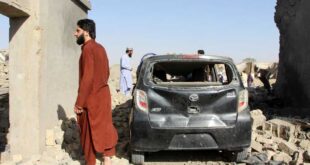Dr. Shehab Al Makahleh
The unfolding dynamics in the Middle East, particularly amidst the ongoing Gaza war, signal a complex interplay of global power politics. As historian Paul Kennedy aptly observed in “The Rise and Fall of the Great Powers”, the contemporary maneuverings of dominant nations in the Eastern Mediterranean echo a strategic dance aimed at outmanoeuvreing rivals rather than instigating a direct global conflict.
The involvement of emergent global powers such as Russia and China in the region underscores a deliberate attempt to challenge the dominance of the United States. Their calculated moves align with a well-thought-out strategy of inducing what Kennedy termed an “Imperial Overstretch” within the US geopolitical domain. By compelling the United States to overextend its resources and attention in multiple theatres like Europe and the Pacific, these global players seek to create openings for their own geopolitical agendas to gain ascendancy.
The current situation in the Middle East serves as a poignant backdrop to this intricate power play. Amidst the turmoil in Gaza, it is evident that the United States is opting for a more rhetorical engagement strategy, exercising caution and restraint. This approach suggests a conscious effort to navigate the crisis without becoming deeply entangled or escalating the conflict further.
The methodical choice of a restrained and formal role by the United States speaks volumes about its cognizance of the broader geopolitical maneuvers at play. Aware of the strategic implications and the potential to be drawn into a larger confrontation, the US is treading carefully while maintaining a watchful eye on its broader global commitments.
However, this careful positioning does not imply a withdrawal from the region. Instead, it highlights a nuanced understanding of the intricacies of global power dynamics and a strategic recalibration of priorities. By opting for a measured approach, the United States aims to safeguard its interests while avoiding becoming mired in a conflict that could stretch its resources thin and divert its attention from critical strategic areas.
In light of these developments, it becomes crucial for the United States to maintain a delicate balance between asserting its presence and influence in the Middle East and navigating the evolving geopolitical landscape. While the current crisis demands a cautious response, the US must remain vigilant and adaptive, ready to recalibrate its strategy to effectively address the multifaceted challenges posed by the emerging power dynamics in the region.
As the global power paradigm continues to shift, it is imperative for the United States to foster strategic partnerships, uphold diplomatic channels, and leverage its influence to promote stability and peace in the Middle East. By doing so, the United States can effectively navigate the intricacies of the current crisis while safeguarding its long-term geopolitical interests and global influence.
In the midst of these geopolitical maneuvers, it is crucial for the United States to reinforce its diplomatic efforts, leveraging its long-standing alliances and partnerships to foster collaborative solutions to the ongoing conflict in the Middle East. By engaging in constructive dialogue with regional stakeholders and global partners, the US can play a pivotal role in facilitating meaningful negotiations and promoting de-escalation measures that pave the way for a sustainable peace agreement.
Furthermore, in the face of the multifaceted challenges posed by regional conflicts, it becomes increasingly imperative for global powers to prioritise multilateral cooperation and adopt collective security mechanisms. The intricate web of issues in the Middle East demands a concerted effort to move beyond unilateral actions and cultivate collaborative approaches that involve a spectrum of nations. By transcending the limitations of a zero-sum game mentality, countries can collectively engage in addressing the root causes of conflicts, paving the way for sustainable solutions that contribute to lasting peace and stability in the region.
In this context, fostering inclusive diplomatic initiatives and building platforms for dialogue becomes paramount. Global powers should actively support and participate in diplomatic endeavours that bring diverse stakeholders to the negotiation table. By encouraging open communication and understanding between nations, a foundation can be laid for the resolution of longstanding disputes and the establishment of frameworks that promote cooperation rather than confrontation. Prioritising mutual understanding will not only mitigate the immediate risks of conflict escalation, but also contribute to the creation of a more resilient and harmonious Middle East, resilient to the challenges that have long plagued the region.
Amidst the ongoing Gaza war and the deployment of global powers in the region, the international community must remain steadfast in its commitment to upholding the principles of peace, security and respect for human rights. By fostering a culture of dialogue, cooperation and conflict resolution, nations can collectively strive towards a more stable, secure and prosperous future for the Middle East, one that is built on the foundations of mutual respect, understanding and shared prosperity.
 Geostrategic Media Political Commentary, Analysis, Security, Defense
Geostrategic Media Political Commentary, Analysis, Security, Defense





